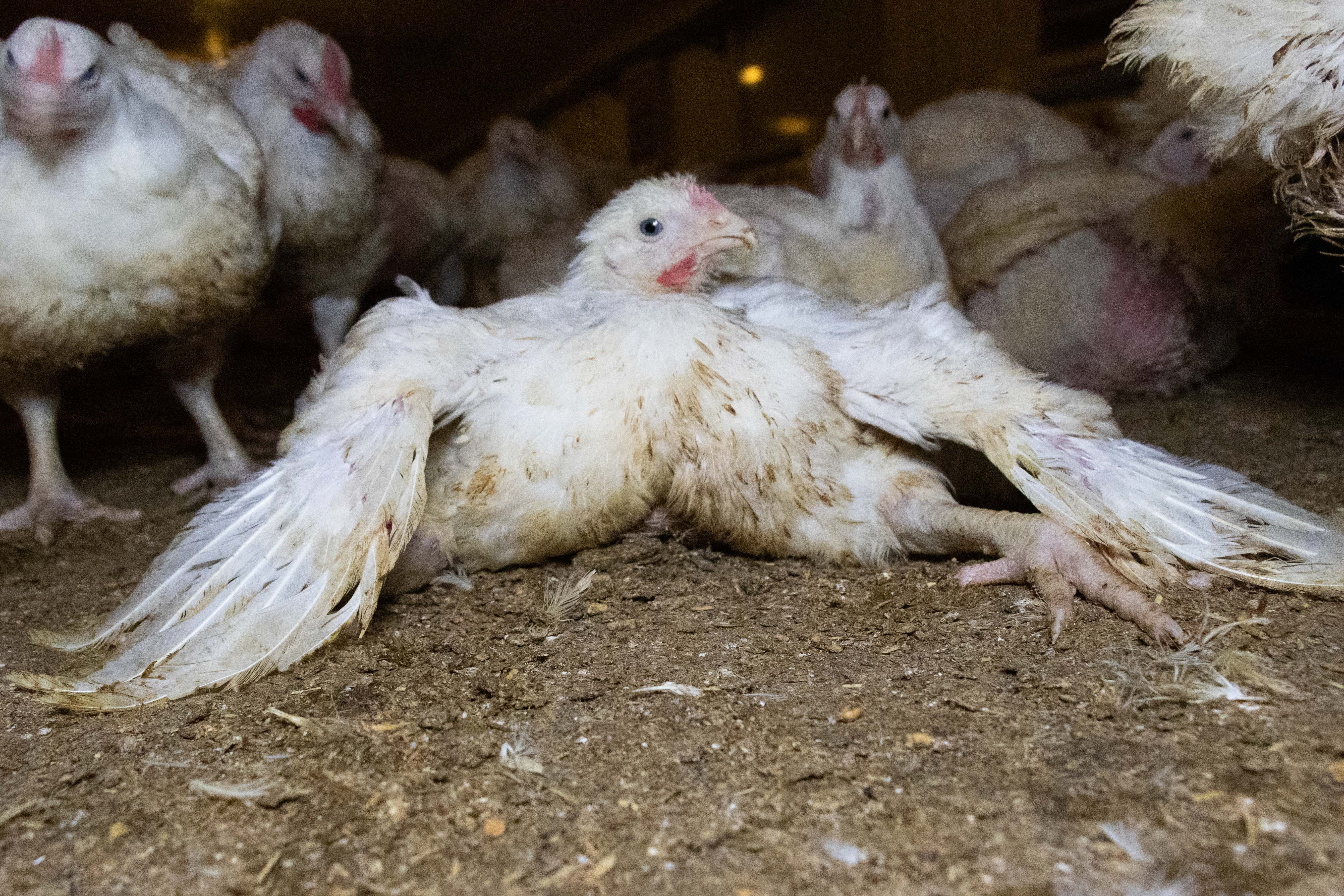We’re being lied to by deceptive welfare labelling on animal products
The government must ensure that all animal products clearly explain how the animal lived and died, and explicitly label lower welfare imports as below UK standards. That’s the bare minimum we should demand


The government has just launched a call for evidence on animal welfare labelling reform. With the global emergency of climate change, awareness of factory farming and its impact on both animals and greenhouse gas emissions is becoming of increasing concern.
Major progress is needed to save the planet and the animals we share it with. To solve this, we need food businesses to tell the truth. Right now, they do not. Unethical practices thrive on secrecy. We became aware of the cruel realities of factory farming, not from the retailers we give our trust and money to, but from animal rights activists like myself conducting covert investigations. If it was up to supermarkets, we’d be almost totally in the dark, unaware of the alarming impact of the food on our plates.
The current state of animal welfare labelling is outrageously deceptive and it keeps factory farming in business. Whether you eat meat or not, most people would agree that we have a right to make informed choices at the checkout. Knowledge is power.
I welcome the government’s appetite to look at this tremendously overdue reform, and I have some suggestions as to how the rules need to change.
Firstly, there is currently no requirement to tell you even basic facts about how an animal was raised or killed. Take a look at some cheap chicken from any of the large supermarkets. You may notice words like “welfare assured” and “reared with care”, and a Red Tractor “assured” logo. Some packaging for animal products – which come from factory farms – actually display green meadows.
Putting propaganda to the side, you may also notice that most of this packaging doesn’t include any actual facts at all about how the animal was raised or killed. Eggs are the one exception where the packaging is required to say something, and even then the information is insufficient at best.
Factory-farmed animal products – the vast majority – have basically no positives to advertise, therefore the retailers simply choose to find solace in silence.
They don’t need to tell you that the chicken was 35 days old when it was slaughtered or that the sow gave birth in a crate, unable to turn around and help her piglets. That the dairy cow had their baby stolen within a few hours of birth, that your food was made in a filthy, industrial, disease-prone factory, or whether the animal was conscious or not when having their throat cut.
Is ignorance really bliss when this is the price? There has been understandable debate over the prospect of lower welfare imports from overseas. You could soon be buying cow meat that would be illegal to produce in Britain next time you go through the checkout – all without knowing it.
The UK government must ensure that all animal products clearly explain how the animal lived and died, and explicitly label lower welfare imports as below UK standards. That’s the bare minimum we should demand.
We need to end factory farming, but despite all their talk of “sustainability”, retailers really don’t seem to want us to. Look at the example of chicken packaging again. A reasonable person might see the cute Red Tractor and feel relieved. It looks like it could be from a cartoon. Their ads are warm and they make farms look like storybook pictures. Unfortunately, that’s exactly what this is – just a story.
Red Tractor is an industry-funded company, and has been exposed for failing to assure even basic animal welfare. It has been found that on a number of Red Tractor approved farms, chickens are bred to grow so fast that their bodies often collapse and are raised in conditions so crowded that they’ll have more room in the oven. It seems to me that the little red tractor is a very useful, very empty rubber stamp.
What about “welfare assured”? “Reared with care”? Surely you can’t just put that on food packaging without evidence to back it up? You can. “Welfare” is just a vague, undefined ideal. And how would you objectively define “care” or “trusted farms”? These are opinions, but they sure do sound like facts. What “welfare” means to a supermarket executive is probably quite different to what it means to you.
In my view, many companies do this because it keeps you buying cheap, factory-farmed meat. It takes advantage of the (lack of) rules. It’s intentionally misleading.
This year, my organisation investigated four separate intensive chicken farms supplying Morrisons’ “welfare-assured” Market Street Butchers’ chicken. We discovered the animals were dying deformed and in agony. All four farms were Red Tractor approved.
Not exactly the quaint, high standard product advertised on the package. This is deceptive animal welfare labelling in action. The consequences are that we continue to buy, animals continue to suffer, consumers continue to be duped, and the planet gets hotter.
To keep up to speed with all the latest opinions and comment sign up to our free weekly Voices Dispatches newsletter by clicking here
“It’s called marketing” some may argue, but we’re not talking about video games here. This is about the lives and deaths of millions of sentient, intelligent beings. This is about saving the planet. Animal welfare labelling deserves unique scrutiny because the stakes are too high to ignore – and based on the case with eggs from caged hens, it seems that clear labelling can affect consumer behaviour dramatically.
Food businesses must be regulated to stop this humane-washing. Both to help consumers make informed choices and to encourage a shift towards a more sustainable future.
Finally, animal products must come with warnings of their consequences. Intensive animal agriculture is one of the leading causes of climate change. It is also the largest human cause of animal suffering, and our greatest pandemic risk. That’s three catastrophically negative consequences, and yet, “meat” is nowhere to be found in the recent 2300-word climate pledge from the government.
For some reason, factory farming keeps getting off the hook. We have to start treating factory farming like the burden it is. Just like cigarettes carry health warnings, animal products must come with their own.
We need conscious, responsible labelling. Food businesses must be regulated to show the farm the animal actually came from. They must be required to warn of the environmental damage each of the products they profit from causes. We can handle the truth. The alternative is an ignorance that we, the animals and the planet can no longer afford.
Connor Jackson is the CEO of Open Cages. You can respond to the government’s call for evidence on accurate animal welfare labelling here

Join our commenting forum
Join thought-provoking conversations, follow other Independent readers and see their replies